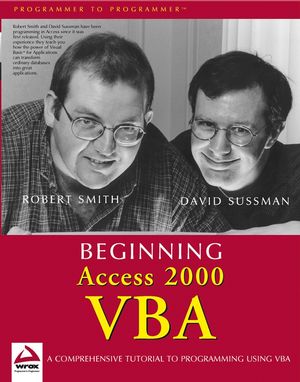Beginning Access 2000 VBAISBN: 978-0-7645-4383-8
Paperback
896 pages
April 2000
 This title is out-of-print and not currently available for purchase from this site.
|
Access 2000 is an important part of the Office 2000 program suite, and is available on both the Premium and Professional editions of Office 2000. Access has traditionally been the Office suite database program par excellence. It still remains that way, but with Office 2000 the face of Access is changing. This book will look at the traditional role of Access and its future uses in the Office suite.
Using VBA (Visual Basic for Applications), the user can program his or her own programs in what is essentially a subset of the Visual Basic programming languages. This is tremendously powerful, as it allows you to create great User Interfaces (forms etc), as a front end to actual database storage and manipulation. This continues to be one of the great strengths of programming Access VBA.
This book updates, expands and improves Beginning Access 97 VBA Programming, in an Office 2000 setting. All the great tutorial content, teaching people how to program with VBA in Access is there, but now majorly rewritten to take account of Office 2000.
- Updated to take account of the Office 2000 facilities
- Constructs a substantial example application with VBA
- Database theory taught in the Wrox Beginning style
What does this book cover?
In this book, you will learn how to
-
Construct a substantial example application with VBA
-
Master the foundations of Visual Basic for Applications
-
Understand the concepts behind classes and objects
-
Understand how Automation can be used to link Office applications
-
Create custom objects using the Class Module feature
-
Debug your programs and implement robust error handling
-
Add support for multiple users
-
Publish your Access database on the Internet
-
Optimize and add polish to your finished database application
Who is this book for?
This book is for users who already have a basic knowledge of databases and the basic Access objects, such as tables, queries, forms and reports. You now want to expand on your existing knowledge of Access and wish to learn how to program in VBA. You don't need any prior programming experience, although a basic knowledge of Access macros would be helpful.



